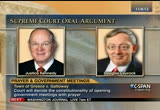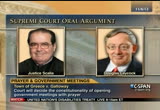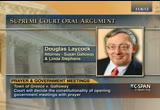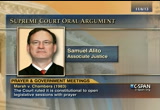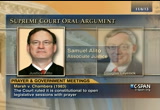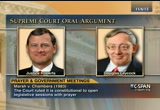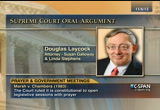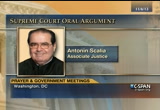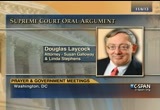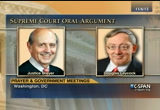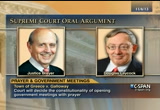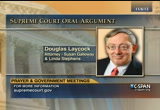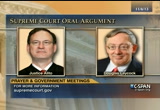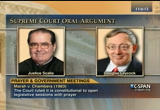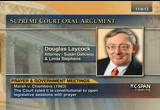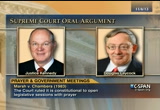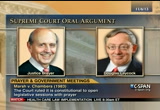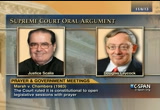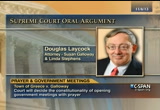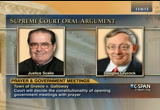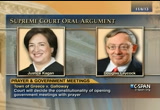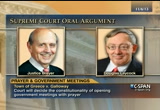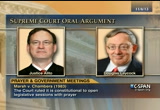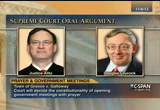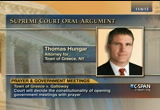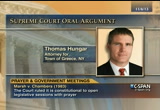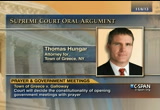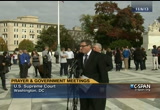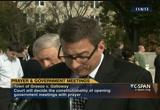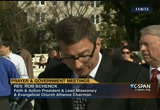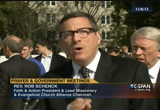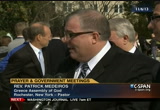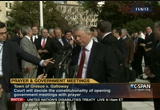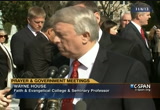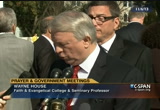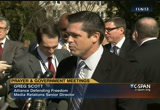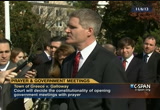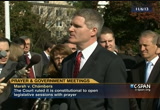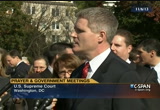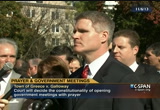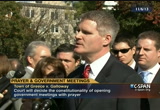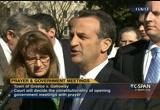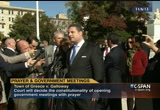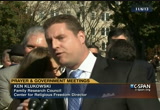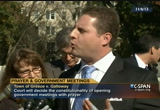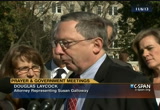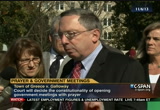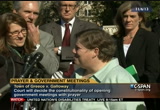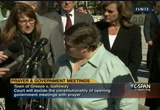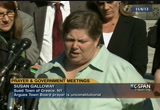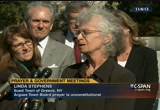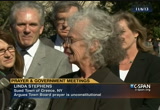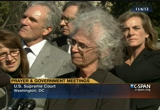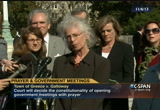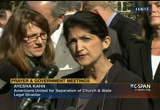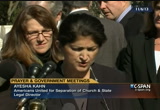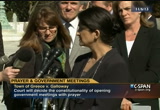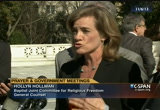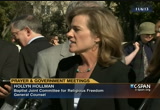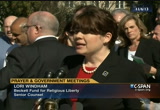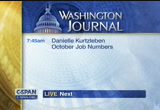tv Key Capitol Hill Hearings CSPAN November 9, 2013 6:00am-7:01am EST
6:00 am
the in other words, government is now editing the content of prayers? >> editing the content of government-sponsored prayers. of course these clergy can pray any way they want on their own time with their own audience. but this is an official government event. and it's part of the board's meeting. it's sponsored by the government. and they delegate the task to these clergy and they can define the scope of that >> your point is that it coerces, it's bad because it coerces? >> it coerces the people who are about to stand up and ask for things from the board and >> if there is -- if coercion is the test of the free exercise clause, why do we need a free exercise clause? if there's coercion -- i'm sorry -- of the establishment clause, why do we need the establishment clause? if there's coercion, i assume it would violate the free exercise clause, wouldn't it? >> well, i think that's right. and that's why >> so it seems to me very unlikely that the test for the establishment clause is identical to the test for the free exercise clause.
6:01 am
>> well, it seems to me unlikely 0 as well. coercion is one test for the establishment clause, but there is also broad agreement on the court, and there has been, that sectarian endorsements are prohibited by the establishment clause. >> what exactly since you are adopting the coercion test, what exactly is coercive in this environment? having to sit and listen to the prayer? >> there are many coercive 19 aspects here of varying degrees of importance. citizens are asked to participate, to join in the prayer. they're often asked to >> they are asked to participate, and -- but not in any tangible way. they say, "well, i'm not going to participate, and everybody's just sitting there." >> they are often asked to physically participate, to stand or to bow their heads. the testimony is most of the citizens bow -- most of the citizens bow their heads whether they are asked to or not. so people who are not
6:02 am
participating are immediately visible. the pastors typically say: "please join me in prayer." they offer the prayer on behalf of everyone there. they talk about "our christian faith." >> this is coercion? he says, you know -- he says, "may we pray," and somebody doesn't want to pray, so he stays seated. >> what's coercive about it is it is impossible not to participate without attracting attention to yourself, and moments later you stand up to ask for a group home for your down syndrome child or for continued use of the public access channel or whatever your petition is, having just, so far as you can tell, irritated the people that you were trying to persuade. >> let me give you an example of a practice that's a little bit different. maybe you'll say it's a lot different from what the town of greece does. first of all, this town starts out by making -- by proceeding in a more systematic and comprehensive way in recruiting chaplains for the month or whatever it is. so instead of just looking to all the houses of worship within the town, it identifies places of worship that may be outside the town boundaries
6:03 am
that people within the town who adhere to a minority religion may attend. and it makes it clear that it's open to chaplains of any religious -- of any religion on a rotating basis. and then they have -- they structure their proceedings so that you have the prayer, and then 0 the legislative part of the town meeting. and then there's a clear separation in time and access between that part of the proceeding and the hearing where variances and things of that nature are held. now, you would still say that's unconstitutional because you have to add on that a prayer that is acceptable to everybody; is that it? s there any other problem with what i've just outlined? >> well, if the separation in time really works, that's part of the remedy that we've suggested that is possible
6:04 am
here. we still believe that prayers should be nonsectarian. >> on the remedy, this case was remanded by the second circuit for the parties together with the court to work out appropriate relief. and if you could tell us what you think that relief would be, because then that is a measure of the constitutional infraction. so what would -- you put yourself before the district judge and propose the changes that you think would be necessary to bring this practice within the constitutional boundary. >> well, we think the town has to have a policy. >> well, just to be clear, are you talking about what would be satisfactory to the second circuit or satisfactory to you? because you don't accept the second circuit's approach. >> well, we've tried to sort out the totality of the circumstances to make it clearer. >> what my question was >> i'm talking about what would be-19
6:05 am
>> your theory, and you say existing situation violates the constitution. so what changes do you think would need to be made >> we think >> that would bring this within the constitutional boundary? >> we think the town needs a policy. the policy should give guidelines to chaplains that say: stay away from points in which believers are known to disagree. and we think the town should do what it can to ameliorate coercion. it should tell the clergy: don't ask people to physically participate. that's the most important thing. the government suggests disclaimers might help. we think that's right. the government suggests separating the prayer a bit more in time. some states put their prayer before the call to order.
6:06 am
the prayer could even be five minutes before the beginning of the meeting. the coercion can't be entirely eliminated, but the gratuitous coercion, the things that are done that don't have to be done in order to have a prayer could be eliminated. and we think those two pieces are the components of a remedy. >> mr. laycock, it seems to me that you're missing here is -- and this is what distinguishes legislative prayer from other kinds -- the people who are on the town board or the representatives who are in congress, they're citizens. they are there as citizens. the judges here are not -- we're not here as citizens. and as citizens, they bring, they bring to their job all of -- all of the predispositions that citizens have. and these people perhaps invoke the deity at meals. they should not be able to invoke it before they undertake a serious governmental task such as enacting laws or ordinances? there is a serious religious interest on the other side of
6:07 am
his thing that -- that -- that people who have religious beliefs ought to be able to invoke the deity when they are acting as citizens, and not -- not as judges or as experts in -- in the executive branch. and it seems to me that when they do that, so long as all groups are allowed to be in, there seems to me -- it seems to me an imposition upon them to -- to stifle the manner in which they -- they invoke their deity. >> we haven't said they can't invoke the deity or have a prayer, and they can certainly pray any way they want silently or just before the meeting. we've said they cannot impose sectarian prayer on the citizenry, and that is very different from what congress does, it is very different from what this court does. maybe the closest analogy is legislative committee hearings where the citizens
6:08 am
interact. we don't have a tradition of prayer there. what -- what -- what the town board is doing here is very different from anything in the tradition that they appeal to. >> are you -- i would like you to take into account an aspect of this. i mean, in my own opinion, i don't know of anyone else's, i'm not talking for others. but one -- a major purpose of the religion clauses is to allow people in this country of different religion, including those of no religion, to live harmoniously together. now, given that basic purpose, what do we do 0 about the problem of prayer in these kinds of legislative sessions? one possibility is say, you just can't do it, it's secular. ut that is not our
6:09 am
tradition. >> that's correct. >> all right. the second possibility is the one that you are advocating. and it has much to recommend it, try to keep non-denominational, try to keep it as inoffensive to the others as possible. that's the upside. the downside is seeing supervised by a judge dozens of groups, and today, there are 60 or 70 groups of different religions coming in and saying, no, that doesn't work for us, this doesn't work for us, and that's the nightmare that they are afraid of. i mean, even in this town or in the area, there are significant numbers, as well as christians, of jews, of muslims, of baha'is, of hindus, and others. all right. so there's a third approach, and that is say, well, you can't have them if there's any aspect of coercion. but we just saw people walking into this room, "god save the united states" and you want to win your case. i didn't see people sitting down. all right. then the fourth approach, which is the other that has -- makes its appearance here, is 0 to say let's try to be inclusive. now, was enough -- in other words, so you didn't get the
6:10 am
right prayer today, but you -- and even with the nonreligious, you know many believe in the better angels of our nature and the spiritual side of humankind; it's not impossible to appeal to them. so you say, you'll have your chance. and that's the thing i -- i would like you to explore. i mean, is there a way of doing that or is that preferable to the other ways or do we get into trouble? >> we think that rotation does not work. first of all, because -- for several reasons, but most citizens come for a single issue to one or two meetings. they get the prayer they get that night. they don't benefit from the rotation scheme. any rotation scheme will be dominated by the local majority, maybe even disproportionate to its numbers. religious minorities --
6:11 am
unfamiliar minorities give the prayer. there are often political protests; there are often threats and hate mail. they don't want to give the prayer. and many city councils won't stand up to the political pressure and enable those people to give the prayer. so there are multiple reasons why rotation does not solve the problem here. we think nonsectarianism has a very long tradition. the government is not a competent judge of religious truth, madison said, that was not a controversial proposition in the founding. and even in the first congress, in the prayers they point to, there were no prayers there that violate our principle, 16 invoking details in which believers disagree. because then, 98.5% of the population was protestant, christ was not yet a point that disbelievers disagreed. >> well, that gets exactly to the -- that gets exactly to the problem with your argument about nonsectarian prayer. yes, when -- at the beginning of the country, the population was 98 percent-plus protestant. then it became predominantly christian. then it became predominant almost exclusively christian and jewish. and it -- but now, it's not that -- it's it's gone much further than that. so we have a very religiously diverse country. there are a lot of muslims, there are a lot of hindus,
6:12 am
there are buddhists, 5 there are baha'is, there are all sorts of other adherents to all sorts of other religions. and they all should be treated equally, and -- but i don't -- i just don't see how it is possible to compose anything that you could call a prayer that is acceptable to all of these groups. >> we >> and you haven't given me an example. >> we -- we cannot treat -- i'm not a pastor -- we cannot treat everybody, literally everybody equally without eliminating prayer altogether. we can treat the great majority of the people equally with the tradition of prayer to the almighty, the governor of the universe, the creator of the world >> you want to pick the groups we're going to exclude? >> i think you picked them, your honor. >> the baha'i, who else? these -- these groups are too small to -- >> we've already excluded the atheists, right? >> yeah, the atheists are out already. >> we've excluded the atheists. i don't think the baha'i are excluded, but i'm not certain. >> ok. so who else?
6:13 am
i mean, you suggest -- you say just the vast majority is 0 all that we have to cater to. >> well, i -- i think the -- the atheists are inevitably excluded. we can't help >> ok. good. got that. number 1, atheists. who else? >> true poly -- true polytheists who don't understand their gods as manifestations of the one god are probably excluded. i'm not sure many others are. and you have all these lawyerly hypotheticals, but the fact is we've done this kind of prayer in this country for 200 years. there's a long tradition of civic prayer and the clergy know how to do it. when in greece, no one has told them that's what we want you to do. and -- and i would say the one time the country in a major way got involved in government-sponsored, sectarian prayers that people disagreed about was when we imposed protestant religious exercises on catholic children in the 19th century. and that produced mob violence, church burnings, and people dead in the streets. >> mr. --
6:14 am
>> we've already separated out, i thought, in our jurisprudence, children and adults. >> well, lee v. weisman twice reserves the question of whether adults might be subject to similar pressures. >> well, you do accept the fact that children may be subject to subtle coercion in a way that adults are not, right? >> in some ways that adults are not. but there's -- there's no doubt that before you stand up to ask for relief from a governing body, you don't want to offend that body. adults are subject to coercion here. and -- and no competent attorney would tell his client, it doesn't matter whether you visibly dissent from the prayer or not. you try to have your client make a good impression. >> well, i just want to make sure what your position -- your position is that town councils like greece can have prayers if they are non-provocative, modest, decent, quiet, non-proselytizing. that's your position? >> i wouldn't use all those adjectives, but yes. and we don't think that's difficult to do. >> mr. -- >> congress has a set of guidelines which you've read
6:15 am
and are here in the papers 0 and so forth. are those satisfactory to you? >> we'd like to be a little more explicit, but those are vastly better than >> if those are satisfactory to you, then i wonder, are they satisfactory to everyone. and -- and you will find all kinds of different beliefs and thoughts in this country, and there will be people who say, but i cannot give such a prayer if i am a priest in that particular -- or a minister or whatever in that particular religion. i must refer to the god -- to god as i know that god by name. and what do we do with them? that's what -- i mean, we can recommend it, but can we say that the constitution of the united states requires it? >> you know, there are such people and i respect that and they should not be giving government prayers. they're taking on a government function when they agree to give the invocation for the town board. >> mr. laycock -- >> well, that's -- that's
6:16 am
that's really part of the issue, whether they're undertaking a government function or whether they're acting as citizens in a legislative body, representative of the people who bring -- who bring to that their their own personal beliefs. i think the average person who -- who -- who participates in a legislative prayer does not think that this is a governmental function. it's a personal function. and -- and that's why we separate out the legislative prayer from other kinds of prayers. >> they're -- they're not praying for their congregation. they are -- they are invited by the board, the prayer-giver is selected by the board, the board decides to have the prayer, the board gives this one person and only one person time on the agenda to pray. this is clearly governmental as you held in santa fe >> if you had an atheist board, you would not have any prayer.
6:17 am
>> precisely. >> i guarantee you, because it is a personal prayer that the members of the legislature desire to make. >> counsel, assuming that we don't >> mr. laycock, would you >> justice sotomayor. >> assuming -- you hear the 0 resistance of some members of the court to sitting as arbiters of what's sectarian and nonsectarian, and i join some skepticism as to knowing exactly where to join that line. assuming you accept that, what would be the test that you would proffer, taking out your preferred announcement that this prayer has to be nonsectarian? >> well, the test that we have proffered is the test from the mccreary dissent, points on which believers are known to disagree. so you don't have to be a theologian. points on which people are commonly known to disagree, and the fourth circuit has had no difficulty administering this rule. the cases that come to it are clearly sectarian or clearly nonsectarian. >> it just seems to me that enforcing that standard and the standard i suggested
6:18 am
involves the state very heavily in the censorship and and the approval or disapproval of prayers. >> but it's not censorship when it's the governmental >> that may play ultimately in your position if we say that that's why there shouldn't be any prayer at all. but then you have the problem mentioned by justice scalia that we are misrepresenting who we really are. >> if you really believe government can't draw lines here, then your alternatives are either prohibit the prayer entirely or permit absolutely anything, including the prayer at the end of our brief, where they ask for a show of hands, how many of you believe in prayer? how many of you feel personally in need of prayer? if there are no limits, you can't draw lines. >> that's not a prayer. that's not a prayer. >> well, it was how >> "how many of you have been saved? " that's not a prayer. >> it was how he introduced his prayer, and if you can't draw lines i don't know why he can't say that. >> mr. laycock, sort of, all hypotheticals aside, isn't the question mostly here in most communities whether the kind of
6:19 am
language that i began with, which refers repeatedly to jesus christ, which is language that is accepted and admired and incredibly important to the majority members of a community, but is not accepted by a minority, whether that language will be allowed in a public town session like this one. that's really the question, isn't it? >> that's the issue that actually arises in the case. >> that's the issue that actually arises. here's what -- i don't think that this is an easy question. i think it's hard, because of this. i think it's hard because the court lays down these rules and everybody thinks that the court is being hostile to religion and people get unhappy and angry and agitated in various kinds of ways. this goes back to what justice breyer suggested. part of what we are trying to do here is to maintain a multi-religious society in a peaceful and harmonious way. and every time the court gets
6:20 am
involved in things like this, it seems to make the problem worse rather than better. what do you think? >> well, i don't -- i don't think that's true. there are people who distort your decisions. there are people who misunderstand your decisions honestly and -- and innocently. but keeping government neutral as between religions has not been a controversial proposition in this court. and i don't think the fourth circuit has made it worse. they've got a workable rule and the prayers are no longer exclusively christian prayers in the fourth circuit and they have been able to mostly enforce that and there 0 hasn't been litigation at the margins because all the prayers were clearly >> suppose you did this. you combined your two approaches. the town has to -- it cannot -- it must make a good faith effort to appeal to other religions who are in that area. and then you have these words from the house: "the chaplain should keep in mind that the
6:21 am
house of representatives, or you would say whatever relative group, "is comprised of members of many different faith traditions," period, end of matter. is that sufficient, those two hings? >> that would help immensely. we think some of the clergy need more detailed explanation of what that means, but yes, that would help immensely. >> should we write that in a concurring opinion? >> i mean, i'm serious about this. this involves government very heavily in religion. >> well, government became very heavily involved in religion when we decided there could be prayers to open legislative sessions. marsh is the source of government involvement in religion. and now the question is how to manage the problems that arise 0 from that. >> well, marsh is not the source of government involvement religion in this respect.
6:22 am
the first congress is the source. >> fair enough. the tradition to which marsh points. >> the first congress that also adopted the first amendment. >> that -- that's correct, and that had prayers that did not address predestination or having to accept jesus as your savior or any point on which listeners disagree. >> many of them were very explicitly christian, were they not? >> they were very explicitly christian, but that was not a point of disagreement at the time. they stayed away from any issue that protestants disagreed on. >> in a way it sounds quite elitist to say, well, now, we an do this in washington and sacramento and austin, texas, but you people up there in greece can't do that. >> well, it's not that the people in greece can't do it. it's just that this board is functioning in a fundamentally different way from what 0 congress or the state legislature functions. and also >> my understanding is that the first chaplain of the senate was the episcopal bishop of new
6:23 am
york; isn't that correct? and he used to read -- he took his prayers from the book of common prayer. that was acceptable to baptists at the time, quakers? >> well, it wouldn't have been their choice. but did he talk about the choice between bishops and presbyters and congregations as a way of governing the church? they have not offered a single example of a prayer in the founding era that addressed points on which protestants were known to disagree. and i don't think there is one. the founding generation kept government out of religious disagreements. and what has changed is not the principle. what has changed is that we have a wider range of religious disagreements today. if there are no further questions, we ask you to affirm. >> thank you, mr. laycock. mr. hungar, you have 3 minutes remaining. >> thank you, mr. chief justice. first i would like to correct one factual misimpression, the assertion that only non-christian prayer-givers delivered the prayer after 2008. it's not in the record, but the official web site of the town of greece shows that at least four non-christian prayer-givers delivered prayers thereafter in 2009, '10, '11 and '13. on the sectarian points, clearly the line >> counsel. >> i'm sorry? >> one a year. >> i'm sorry, your honor? >> four additional people after the suit was filed.
6:24 am
>> yes, your honor. >> one a year. >> approximately. >> how often does the legislature meet? >> once a month. and on the sectarian line, i just like to point the court to the senate brief, the amicus brief filed by senators, pages 8 to 17 which shows the extensive history from the beginning of the republic 0 until today of prayer in congress. that would be sectarian and unconstitutional under respondent's position. with respect to coercion, it's unquestionably true that there is less basis for claiming coercion here than there was in marsh. in marsh, senator chambers was required to be on the senate floor by rule, he had to be there to do his job and the practice was to stand every single time, which he did because he felt coerced to do it; whereas, here, the record suggests that there were three times when somebody requested people to stand out of 121 occasions.
6:25 am
the idea that this is more coercive than marsh is absurd. in marsh the court expressly rejected a coercion argument saying, "we expect adults to be able to deal with this." with respect to the history, as well, i think the debate in the continental congress, when this issue was first raised, shows what the american tradition has been. that is americans are not bigots and we can stand to hear a prayer delivered in a legislative forum by someone whose views we do not agree with. that is the tradition in this country, and that's why it doesn't violate the establishment clause. and finally, with respect to the fact that this is a municipality rather than a state or local federal government. that can't possibly make a difference as an establishment clause matter. it makes no sense to suggest that a prayer at the local level is more dangerous for establishment clause purposes than what congress is doing. only congress could establish a
6:26 am
religion for the entire nation, which is the core preventive purpose of the establishment clause. to suggest that there are greater restrictions on municipalities makes no sense at all. we think that the dangerously overbroad theories advanced by respondents are at odds with our history and traditions, which we reflect this tradition of tolerance for religious views that we don't agree with in the legislative context. respondent's theories also conflict with the religion clauses mandate, that it's not the business of government to be regulating the content of prayer and regulating theological orthodoxy. thank you. >> thank you, counsel. the case is submitted. >> after the arguments, lawyers and advocates on both sides of the issue spoke with reporters. his is half an hour. >> in about 30 seconds, i will begin. >> >> of course. i am reverend schenck, president of faith and action
6:27 am
that filed a brief in this case. with me today is pastor madeiros of greece, new york, who has authored many of the prayers before the town council that are at issue in this case. it is a very vigorous exchange between the justices and the attorneys representing the two sides of this debate. we heard more than a few justices who are quite skeptical about the government dictating how or when clergy or any citizen is allowed to pray. this court has consistently ound that prayers offered at legislative sessions are onstitutional.
6:28 am
we argue in our brief about legislative prayers totally consistent with both the declaration of independence and with the constitution. f they weren't, as some of the justices alluded to, the court would be in trouble with tself. they began with a form of prayer when the marshall declared "god save the united states and this honorable
6:29 am
court." as a number of justices made in their remarks today, the government has a dubious role dictating the content of any prayer. the government has no authority to instruct anyone in the form or content of prayer. to tell the citizens when he or she is to pray or not to pray, it is a flagrant violation of the first amendment free exercise clause that expressly prohibits the government from interfering with religious exercise. i felt we heard the justices say very clearly that a government official is in no position to dictate how a prayer should be worded. none of us wants the government telling us what a good prayer is and what a bad prayer is.
6:30 am
should this court ban prayer at council meetings or anywhere else, the government would do precisely what the original plaintiffs in this case don't want. that is to establish a religion that requires an innocuous and meaningless prayers to an unknown god. i will yield to the pastor at the center of all of this ctivity. >> good morning. my name is patrick medeiros. i serve at greece assembly of god in the town of greece. i have appeared before the council many times over the last 14 years. i have asked god to bless our community and grant them divine
6:31 am
wisdom as they do the people's business. i have said yes to serve out the community. it is my responsibility as a citizen. it is my prayer that the justices will uphold my constitutional right to ontinue this great tradition to pray during these meetings. thank you. >> i am a participant in the brief in the town of greece versus galloway report today. i am focusing on issues of religion and law. currently distinguished
6:32 am
research professor in tacoma washington. i am pleased with the probing questions of the court today and felt especially good about what i am about to say. the duty to become arbiters of government, as justice souter said, i can hardly imagine a subject less minimal deliberately to be avoided if possible then comparative theology. we agree with the guidance of the marsh opinions that the courts are not the poorest the contents of public prayers and regulating the content violates the establishment clause by imposing an orthodox of neutrality. it would define what theological terms may be used in this prayer , an impossible task. it is not possible to have a religiously neutral prayer. there is a deity and a civic setting confirmed in the
6:33 am
history of our people and the documents confirmed by the supreme court. religions only share some point in common and are quite divergent in others. some religions like christianity and islam believe in one god while some forms of hinduism honor many gods. it cannot provide for a neutral prayer while others are more generally of supreme eings. the religious views are neutered and imposes free exercise in the religion of establishment that flies in the face of the words and practices of those that wrote the first amendment religion clauses. to demand some suppose a neutral prayer is to strike at the core itself. it is where the state will not
6:34 am
nterfere with the percent of pray in a civic context and not defy the theological content of this prayer. thank you. >> good morning, ladies and gentlemen. i am senior director at alliance defending freedom. we have a couple of key members of the legal team who will be delivering a short statement. if you want one-on-one interviews, you can track me
6:35 am
down and i would be happy to facilitate that. tom? >> i am happy to answer questions but i don't have a statement to give. >> the supreme court justices and their remarks to you? >> they have lots of questions for both sides and explored lots of challenging hypotheticals. i never make predictions about how the court is going to rule. the town of greece has a legislative prayer practice consistent with the traditions of this country from its very founding. it is comparable to what the own of greece has been doing
6:36 am
and solemnize is the occasion as they begin their work. there is nothing unconstitutional about that. the other sides' arguments would require government to censor prayers to decree what is orthodox and what is not when prayer givers are giving public prayer. that would be contrary to our traditions of religious liberty. >> where does it end? is there no limit to your osition? >> the supreme court in the prior case in 1983 upholding legislative prayer at the state level said that as long as the rayer is not being exploited by the government to proselytize or denigrate particular faiths, then it's not constitutionally a problem and it is not permissible for the courts to regulate the content of the prayer. and there's no claim that the prayers of the town of greece violate those prohibitions, and therefore they're
6:37 am
constitutional. >> what's wrong with giving clergy and ministers guidelines and guidance as to what's acceptable and unacceptable? >> it depends on what the guidelines are. if the guidelines are what the mavs want here, which is to say you can pray in these words to these deities but not in those words to those deities, that is government regulating the theological content of prayers prescribing what is orthodox and what is not in religion. and that is contrary to our tradition of religious liberty. >> when ministers ask the community to bow their heads or join them in prayer, is that not proselytizing? >> it is not. first of all, no one is required to do it. people are free not to do it. similar things happen from time to time in the legislature or in congress. and since people are free to pray or not as they choose, there's no constitutional problem with that. >> you don't think that would make somebody uncomfortable if they're the only one not standing or bowing their head? >> the supreme court has upheld that someone might object to a
6:38 am
particular practice or made uncomfortable is not the fusional test? constitutional test. we're talking about the establishment clause and whether or not the government is establishing a particular religion. here the town of greece practice is open to people of any religion or no religion if they choose to give an invocation. >> only for members of other religions gave those prayers, why did that not happen until the initial lawsuit? that did not happen in the past. >> the practice like the practice of many governmental bodies was to invite all of the clergy in the town with regardless of denomination or religion to deliver a prayer if it they chose. it happened the people who chose to deliver the prayer in greece were christian until 2008 when after this lawsuit was publicized and the complaints were publicized,
6:39 am
more people became aware of the opportunity and nonchristians began delivering the prayer both in 2008 and several times since then. >> which they actively invite other members of other religions? >> i'm sorry. >> they actively invite other members of other religions? they say, hey, it's open? >> the town has never made a secret of its policy. no one had ever requested prior to the plaintiffs in this case. when the plaintiffs in this case complained, the town offered them an opportunity to give an invocation but they declined. >> did say? >> feeling uncomfortable has been standard for standing. >> i think what i said is that if the supreme court were to adopt the same practice that would raise different constitutional issues. if the supreme court were to adopt a practice of having only one sectarian prayer for a from a particular denomination that would clearly be more constitutionally problematic. that's not the practice here.
6:40 am
>> the identical prayer, a single priest on one occasion, you think that would fly or not fly? >> on one occasion it's hard to say. >> thank you. >> i want to thank tom and his team. they did a great job at the supreme court and been a great addition to the team. i think more importantly, i want to thank the town of greece. this is a concerted effort across our country to completely get rid of what's called public prayer, legislative prayer. there are over 200 cases around the united states where groups are trying to challenge the historical practice of legislative prayer. and many of these small towns can't afford this type of a case. the town of greece stood up. and their case ended up here. but i think it's important, hat plaintiffs want is censorship. i think no one should be in favor of that. i think when you have different prayer givers, they should have the liberty to pray according to the dictates of their faith tradition.
6:41 am
and that's exactly what this town did it discriminated against none. it allowed anyone to comp on? -- come on an equal basis. even atheist plaintiffs were invited to come and give an invocation. you can't have a policy more open than this. and more importantly, and some of the justices asked good questions, should the government be in the position of censoring the way people pray? no. the people should be able to compose their own prayers. it's on a rotating basis. first come, first serve. anyone's invited to attend. i think the justices asked some intriguing questions and hopefully will come up on the defense of prayer that our country has engaged in since its founding. >> family research counsel representing members of congress amicus in this ase. as the briefs we filed on behalf of members of congress show, the reality is that the prayer practice in the town of
6:42 am
greece, new york, is far more religiously diverse than we actually have in the united states congress. ever since the founding of the republic for more than 200 years members of congress have had an official paid chaplain who would be an ordained clergyman who himself personally gives prayers in his own faith tradition. furthermore, 40% of the prayers are offered by guest chaplains as they're sponsored. and each of them praise according to their own faith tradition. in terms of the issues that the lower court in this case recognized as problematic, a ajority of the prayers offered in congress actually include, according to what the other side describes as sectarian, to be faithspecific content. beyond that 97%. of the prayer givers before congress are self identified christian and 97% say that we and us as they pray, facing not
6:43 am
just the members but also the gallery incorporating all of this into what they are saying. in 1983 when the supreme court upheld legislative prayer, it used congress as the touchstone of what is acceptable under the first amendment because it was the same congress that wrote the establishment cause of -- laws of the constitution. it created the house and senate chaplain to offer these every day. we're hopeful the court will go the right way in this course. as being consistent with the establishment clause and to make it clear in our second brief at the time has come to step away from this whole concept of if someone subjectively feel the government is endorsing a religious idea and the test is not endorsement, but coercion. is anyone being coerced to participate in a religious activity contrary to their conscience or some other official establishing religion. that is not what is going on ere. we are hopeful the court will go the right way in this case and reverse the court below.
6:44 am
thank you. >> i argued the case for the plaintiffs. a number of them support the right of citizens to's participate without participating in another prayer service. most of what you heard was false. there is no rotation system. the only or instructions was to call a pastor. they had no one but christian pastors. i have defended many christians in my career. i do not support the right to
6:45 am
use the power of government to impose on religious minorities. that is what is going on. justice hagan samurai star case, kagan summarized our case. you cannot refuse to participate in the prayer just before you stand up to ask the board to take discretionary action that affects you directly and personally. this is highly coercive and also a sectarian endorsement. it violates all of the principals of the establishment clause that both sides of the court, the liberals and conservatives, have agreed to carry and endorsements are prohibited. and we have both of those things in this case. >> what is the larger problem, the message or the method? >> the message. it does not matter who was selected to give the prayer. it matters what the prayer givers says. the prayers in this case are explicitly christian and often heavy handedly christian, talking about the saving grace of jesus christ on the crossed and similar things. we do not care if pastors give
6:46 am
a prayer as long as they remain nonsectarian. >> how can you make them sectarian to appeal to many religions? how can you do that? >> we have a tradition in this country of nonsectarian prayers that appeal to a wide range of positions. it is true you can't protect everybody. but you can protect almost everybody and you can protect more than one faith. this case is about christians aggressively imposing themselves on their fellow citizens with the power of government. that is not right. it is not part of the american tradition. >> can we get the plaintiffs? >> susan galloway. >> i am susan galloway. i am one of the plaintiffs. i just want to thank americans united for being our attorneys and representing us.
6:47 am
i appreciate the justices hearing this case. i think it is important. i feel the town has aligned itself with christianity by just having christian prayer givers. they have had a couple other people but primarily it is christian. that is very sectarian. as a citizen i felt i was different. and because of my own faith and my own religious beliefs. i'm glad that the supreme court is hearing this. is there anything -- >> what are your religious beliefs? >> i am a jew. >> why did it make you feel uncomfortable? >> i think that when you have people that, first of all, the town, the pastors face the people, not to the
6:48 am
government. it is like they are praying over us. i know when i stood then i sat and i have 100 eyes looking at me and questioning what is going on and thinking i am being disrespectful, it does put pressure on you and makes you very uncomfortable. it singles you out. that should not be in my town government. it should not be anywhere. >> you can give the next prayer. why doesn't that resolve it? you can give a jewish prayer. >> if i wanted to give a prayer, that is fine. that excludes other people. i believe that it has been one- sided and it has favored christianity. i do not think that is right. > what would you like to see happen? what do you want to see appen?
6:49 am
>> i would like to see people feel they are included in the government and they are not made second-class citizens. they stone their faith or non-faith. -- based on their their faith or non-faith. i think there are ways of doing it that would be more inclusive than what they are doing. >> i am melinda stevens. i live in the town of greece and i am an atheist. i want to thank the americans united legal staff for putting thousands of hours into this very worthwhile and needed ction. one thing i would like to say to my fellow atheists is, we need to come out of the closet. atheists are starting to come out of the closet now, after /11.
6:50 am
here are many, many of us. e have to follow the lead of the lgbt community and make our voices heard. we can't be shy about this because it is important. we need to be included in town government, and government at all levels. unless we speak up, we are not going to be. >> would any prayer work for atheist's? is there a model that would work for you? >> i have heard atheist indications that i admired. a state senator in arizona gave a wonderful one but he got blowback at the next legislative session from conservative christians. they bashed him and said two prayers for the one he disagreed with the previous time. so it is hard for atheist or other minorities to speak up because susanna and i have both
6:51 am
experienced hostility from our fellow residents in the town of greece. it is not a pleasant experience. >> what happened? >> susan and i got two letters telling us to stay away from town board meetings if we did not like what was going on, to move out of the town if we did not like it. i had vandalism to my house several times. one night someone came in the middle of the night, dug up my mailbox, smashed it, and put it on my car. someone dismantled a fire hydrant, and i have a pool in my backyard, and threw it in the pool. things like that. >> do you think the court decision will change any of what you experienced? >> time will tell. i hope -- and this has been mentioned in the media.
6:52 am
why is it that christians who profess to be moral, upstanding people would do such things? >> any questions? >> i like very much the session -- it very much the way the session began. i thought elena kagan's questioning was excellent. >> do you think they will eliminate legislative prayer or is there a middle ground? >> for years we have had a moment of silence. suddenly in 1999, someone changed all of that for the worst. >> >> i do not know. we have filed reports -- police reports, but never found out. this all happened when the case is being discussed. i have no doubt it was related.
6:53 am
>> thank you. >> my name is aisha khan. americans united has been so proud to have sponsored this case and have represented these extraordinarily brave and ourageous women. we got involved in this case for a very simple reason. we believe that what they were oing is wrong. participating in a local government is a universal right to citizenship. it should not be conditioned on represent -- participation and the lord's prayer or any other prayers that are unique to a particular faith tradition. town residents attend these meetings not as participants. children's sports teams are
6:54 am
invited to receive awards. people come to ask the board to take particular action. exercising those rights and seeking those important benefits should not be conditioned on bowing one's head in recognition of jesus christ. it is important were not asking the board to to discontinue his practice of presenting prayers. we are asking that participants do not be asked to participate in them and that the -- they be nondenominational. "in god we trust" and not in "christ we trust." not one nation under allah or uddha. under the town's view, residents can come and
6:55 am
participate in this meetings nd can be asked to join in a prayer that promises eternal ellfire to anyone who does not accept jesus christ as their savior. hat cannot possibly be constitutional. we hope the supreme court will agree that civic participation should not be conditioned on compromising one's -- >> thank you. >> what do say to atheist who do not believe in god? >> as a professor said, this tradition that the country has followed does in fact not recognize the increasing diversity of this country. we believe under the proposal
6:56 am
we have made that atheists would be allowed to come forward and present a prayer, as would polytheists or anyone else who comes from a more diverse tradition than the monotheistic one that the court opened with today. >> thank you. >> my name is holly. i'm from the baptist committee for joint religious. i'm a council of -- we filed a brief on behalf of of them to stand with them. we stand for religious liberty, and in this case, we stand with those who challenge a prayer practice that would make their political rights incumbent on their participation in a prayer with which they don't agree. one thing the court clearly
6:57 am
recognizes is an important principle of religious liberty. the political right should not depend on their adherence to religion. in this environment that the town council and other local governments where there is direct interaction and anticipatory relationship with government, it is improper for the government to engage in the act of religious worship. this is not something that is against prayer. all religious people should and may need to pray for the elected officials. it is important to understand it is not the role of government to lead and -- a religious act. we have a tradition of liberty to protect all people whether
6:58 am
they believe or don't believe without harming government or religious aggregation. >> your name is? >> holly holman from the baptist joint committee. >> i'm laura from religious liberties. we filed a brief in support of the town of greece. we believe that religious freedom is critical. it that protection should be respected. christians, jews, awakens -- they recognize religious diversity -- wiccans, they recognize religious diversity. allowing these sorts of legislative prayers does not harm our society, it enriches it, by recognizing and respecting our religious diversity and our religious freedom. we are encouraged by the arguments of this morning, and we are hopeful that the supreme court will issue a decision that recognizes the religious freedom of our nation and our long, hundred-year history of permitting legislative prayer. thank you.
6:59 am
funds [captioning performed by national captioning institute] [captions copyright national cable satellite corp. 2013] >> today on c-span, "washington journal," followed by a hearing on international standards for people with disabilities. and later, defense secretary chuck hagel speaking about the focus on asia. in just a moment, "washington journal" is live with your calls and today's headlines, followed by the latest employment numbers and the unemployment rate with "u.s. news & world report's" reporter. then a look at what's next for the affordable care act with "wall street journal" health policy reporter, louise
7:00 am
radnofsky. and later, we'll fwalk a treaty that aims to establish standards for people with disabilities. our guest is eric we'llman. ♪ , it isood morning saturday, november 9, 2013. october pause monthly job report shows the u.s. economy gained a 200,000han expected jobs. on the international front, talks continue between the u.s. and iran on a nuclear deal. and the rocky start with the health insurance exchanges is prompting
70 Views
IN COLLECTIONS
CSPAN Television Archive
Television Archive  Television Archive News Search Service
Television Archive News Search Service  The Chin Grimes TV News Archive
The Chin Grimes TV News Archive 
Uploaded by TV Archive on

 Live Music Archive
Live Music Archive Librivox Free Audio
Librivox Free Audio Metropolitan Museum
Metropolitan Museum Cleveland Museum of Art
Cleveland Museum of Art Internet Arcade
Internet Arcade Console Living Room
Console Living Room Books to Borrow
Books to Borrow Open Library
Open Library TV News
TV News Understanding 9/11
Understanding 9/11